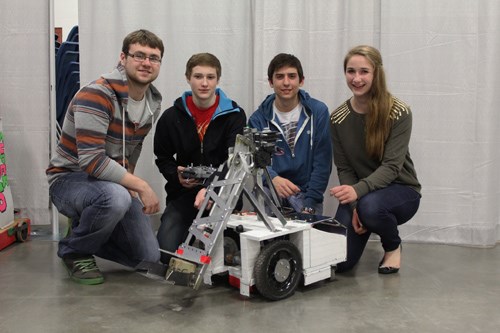Yorkton Regional High School's robotics team is number one in the country after a first-place finish at the Skills Canada National Competition in Edmonton last week.
Along with their national gold medals, the four-person Grade 10-12 team-Rachael Machnee, Bo Chiasson, Jayden Leister, and Taylor Pachal-has earned a chance to represent Canada in robotics at the WorldSkills Competition in Liepzig, Germany in July of 2013.
The YRHS group represented Saskatchewan in the May 14 and 15 tournament thanks to their victory at Provincials in March. Sacred Heart High School's 3D computer animation team of Brandon Parfitt and Anthony Fetsch was also at the national Olympics-style Skills tournament, but came up short of a medal.
The eight teams in the robotics event competed with remote-controlled robots they designed and built over the last year in classes and after-school groups such as YRHS's Robotics Club. In a game created by Skills Canada, each robot was required to pick up colored blocks from the ground and place them onto a moveable platform for points while preventing its opponent from doing the same.
The Yorkton team's robot, "tweaked and perfected" since its victory at Provincials according to team member Taylor Pachal, used a bucket similar in style to a front-end loader to pick up blocks and drop them through a trap door in its bottom. The design was unique among the entrants.
"Most of them were a claw type, where you'd grab onto the block, lift it up, and then set it on," said Pachal.
But Team Saskatchewan knew it was up against tough competition. Every design had been proven in battle against other robots and had a provincial gold medal to show for it.
Strategy was the other key component. Driver Bo Chiasson would focus on quickly filling up the target platform's lowest tier with one-point blocks, leaving no room for opponents' blocks. As the clock ran down, he would place blocks on the second and third tiers-worth double and triple points, respectively-and play a defensive game to prevent them from being knocked off.
The team finished Monday's round-robin tournament in good shape, with a few losses but the second-highest number of points to its name.
"Everything went good with our robot. We didn't have much for damages or anything like that," said Pachal.
In the playoffs on Tuesday, the Yorkton team edged out Prince Edward Island-day one's first-place team in points-for a shot at a medal. They had a lucky break in the semifinals when Alberta's robot malfunctioned in the opening moments of the first match, giving Saskatchewan a default victory.
That brought them to the finals as an underdog against Team Ontario, who was undefeated up to that point in the tournament. Saskatchewan had already lost to the smaller, faster robot the previous day.
Ontario's robot utilized another unique design; its block grabber was a scoop with a powered roller that could suck up and eject blocks with speed unmatched by any other competitor. The Ontario team would quickly fill up the bottom tier of the platform with enough one-point blocks to win and then push the platform around the arena in a game of "keep away" with its slower opponents.
But the robot had a weakness: it couldn't lift high enough to reach the second and third tiers, leaving those more valuable spaces to Saskatchewan-provided they could hold their blocks in place to the match's finish.
A loss in the first match would have meant the end for Saskatchewan, but the Yorkton team eked out a narrow 12 to 11 victory. That put the gold medal up for grabs in a sudden-death final round.
As the heated final match drew to a close, Saskatchewan dropped its special three-point block onto the platform's third tier for a total of nine points.
"Basically, what won it in the last couple seconds was kind of a holding situation to keep it on the pan as they were trying to push it off," recalled Pachal.
The final score was 15 to 13.
"Everybody was jumping up and down, high fives, handshakes, everything like that. It was a pretty exciting moment," said Pachal.
"It felt really good, considering we put so much time and effort into practicing and getting the robot down pat," Chiasson said.
"This was a great experience," he added. "I'm only Grade 10 right now, so just being able to get an opportunity when I'm younger, it just feels great."
Only Chiasson and Jayden Leister (Grade 11) are planning to head to Germany next summer for the world championship. Pachal is graduating this spring and continuing his education in Saskatoon while Rachael Machnee (Grade 10) is leaving for England.
Chiasson and Leister will have to build an all-new robot for a very different kind of tournament in Germany. Robots in this event are built from a standard kit and must be autonomous rather than remote-controlled. In addition to electronic and mechanical skills, the project will require programming knowledge far beyond anything the pair has picked up so far.
"It is [intimidating], but I guess it is for everybody at first, because this is a huge step up from Nationals," said Chiasson. "It'll be a great learning experience."




